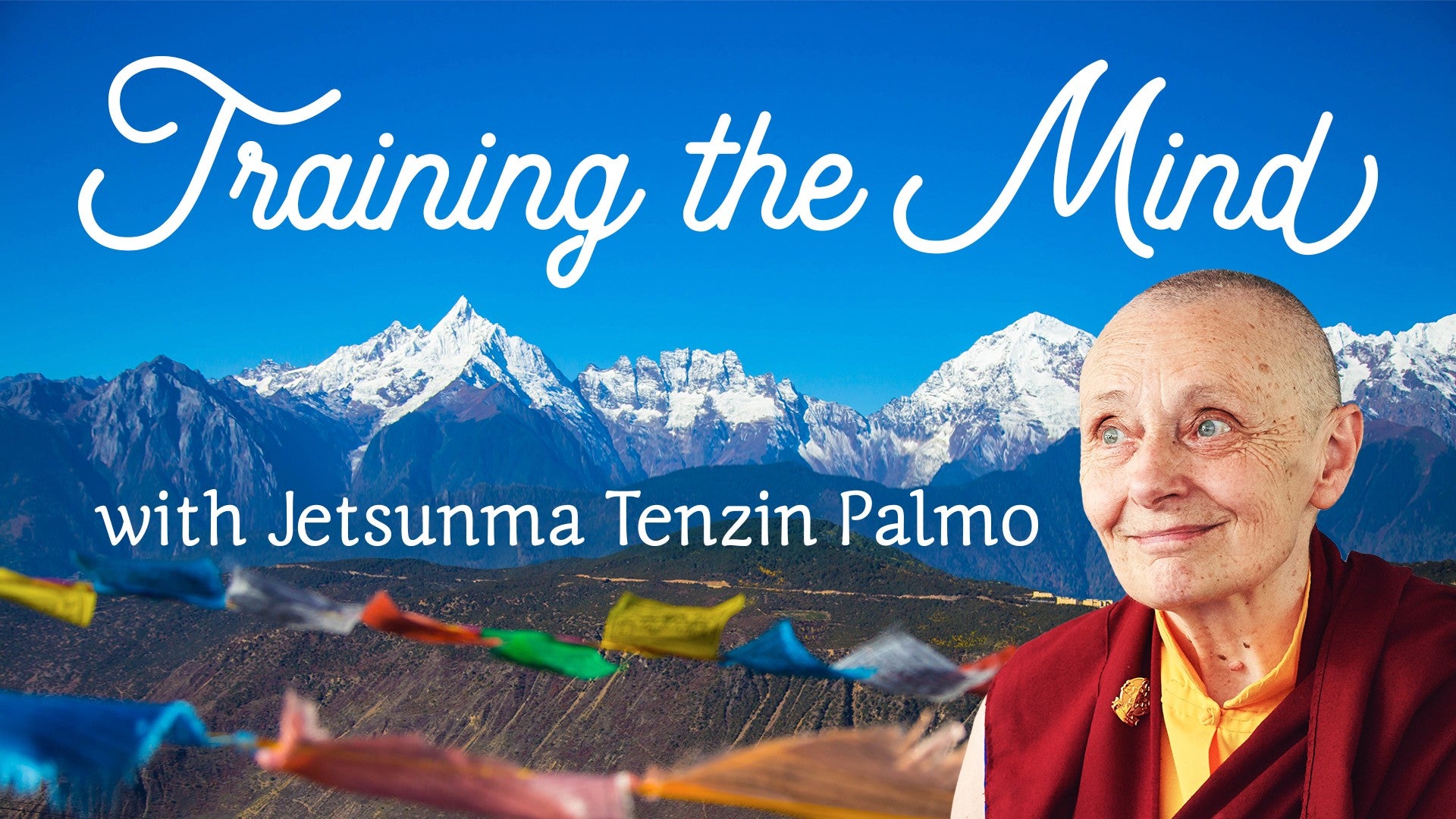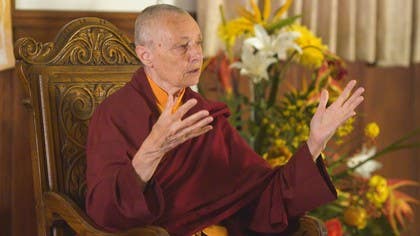Description
About This Video
Transcript
Read Full Transcript
So the supreme ethical conduct is to conduct, that's to pacify one's mind. So again, normally, ethical conduct in Buddhism is taught as control of the physical actions and speech. The basic ethical conduct which is expected from everybody, not just monastics, certainly, but laypeople also. The basic ethical conduct is how to live in this world harmlessly. Even if we don't do any good at this, we don't do any harm.
So that for the rules of the five basic ethical rules are not taking any life. So what does it mean not taking any life? Again, to each one, their own life is most dear, as the Buddha said. Each being, not just human beings, but animals, birds, fish, insects, each one, their own life is most precious to them. They don't want to be hurt.
They don't want to be harmed. Just as we don't want to be hurt, we don't want to be harmed. So all beings hold their own life and well-being as most precious. Therefore, just as we don't want anyone to hurt us, we should not hurt anyone else. So this morning, I was visited by a gentleman who is very much involved in animal rights, in being a voice for animals.
Because although animals have speech, we as human beings cannot understand their speech anymore. We have completely removed ourselves from understanding our empathy towards what these beings are expressing. So therefore, he was concerned because so many Buddhist teachers are not vegetarian. And we were discussing this because, of course, the reasoning behind it is that the Buddhist monks, at the time of the Buddha and also in Theravading countries today, like Thailand and Myanmar, Sri Lanka, they go on arms round. And so they should be non-discriminating.
Whatever is placed in the arms bowl, they should eat. They can't say, oh, I'm sorry, I can only eat gluten free. Sorry, mate, you get what you're given in your arms bowl. So there was total non-discrimination. I mean, there's a story of a leper who made an offering.
And while he was making it, his finger dropped into the begging bowl, and the monk ate the finger. I mean, the idea is that they should be non-discriminating. So therefore, the rule was made for monks that if one did not kill oneself, if one did not ask for it to be killed on one's behalf, or if one was sure that it was not killed on one's behalf. For example, if someone invites monks for a meal, then they might go out and kill one of their sheep or goat to offer the monk. If the monk finds that's what happened, then he should not eat the meal.
So whether one killed it oneself, asked for it to be killed, or knows that it was killed on one's behalf. In that case, it was forbidden. So this was for monks, because they're going on arms round. But this is not for everybody else. I mean, as soon as we sit down to a meal of meat or fish or any other living being, even we didn't kill it ourselves, we are endorsing the meat industry.
We are saying it's OK to bring up animals in often horrendous conditions and kill them. That's OK, because I like the taste. And then where comes our meditations on compassion, on loving kindness? The Tibetans are always about how we are interconnected with all beings, like as if they were our mother. And so they're always going on about all mother-sentient beings.
Then they sit down to a plate of meat more. Excuse me? So even if the teachers themselves say, well, I am so transcendental that my eating of this animal is a blessing for the animal, I think we should have asked the animal first. But even if, still, we all do what our teachers do. If our teacher is vegetarian, the students will be vegetarian.
If the teacher eats meat, then that is an endorsement to eat meat. And so the teachers themselves should be conscious of their own conduct and the implications of their conduct. And even though they themselves are not killing, nonetheless, by endorsing the meat industry, they are causing more and more animals to be killed. It's this hypocrisy, which I find very hard. On the one hand, we're always talking about compassion and loving kindness.
And on the other hand, we'll sit down to a nice steak or a chicken and not care. We're not thinking, what does it mean to eat a living being? When we don't need to, especially California. Good gracious. There's no excuse, except I like the taste of meat.
So the first precept, I think, especially for people like us who do have choices, should be taken more seriously than just, I haven't killed anything. Just by participating in that industry by eating, we are causing beings to be killed by implication. You go to the store and there's no meat. Oh, damn, there's no meat. And this will never happen in California.
But I mean, you know, then if you regret that some animal hasn't been killed, then what? I mean, I think everybody who eats meat should go to a meat factory and take a look at how the animals live and the smell of the slaughterhouses. And the fear, all that fear which goes into the adrenaline of the animal that's been killed. No wonder people get sick. I mean, I think anyone on the spiritual path should really look at their diet, not just gluten-free.
Forget it. Is anything we're eating causing any possible harm to any other being? That's what we have to ask ourselves. Theosophical society has been very good in this. They have been very ethically aware through all the time.
And I mean, the theosophical society started in the late 1800s. But right from the start, and in those days, I mean, being a vegetarian, what? It's unlikely they even had the word. That they had this movement of being very, very ethically, trying to be as ethically as they could be. Trying to be as ethically pure as they could, for which one can really applaud them.
Because this was the day before it became fashionable. Way back in the 1800s and early 1900s, when they were considered very weird and eccentric, because they wouldn't eat meat. Anyway, so the first precept is against taking life. The second precept is against taking that which is not given, which means stealing, including, as I say, returning books and DVDs. The third precept is against sexual misconduct.
In general, that means not using our sexual energies in any way which could cause any hurt or harm to others, which could exploit others, which could have any repercussions, which will create problems, either for ourselves or for others, that we should be sexually responsible. Again, we would look to our teachers for their examples, but sometimes better not look too far. Then the fourth precept is about our speech. Our speech should be not only truthful, it should also be kind. It shouldn't hurt anyone.
It's all about living in this world harmlessly, so that any being coming into our presence knows they have nothing to fear, that we won't cheat them, we won't hurt them, we won't exploit them, that our conduct towards them is based on loving kindness and compassion, if not wisdom. So therefore, our speech should not only be truthful, it should also be kind. It should also be non-divisive, meaning that you don't say to one person something which will turn them against another, but we should bring harmony. And that also against just meaningless chatter and gossip and just blah, blah, blah, blah, blah, without any genuine content to it, that just distracts the mind without having any. Some people just like to talk for the sake of talking against that, and also gossip, passing on stuff, which doesn't need to be passed on.
And then the fifth precept is against intoxicants. So that's against alcohol, drugs, anything which disturbs the mind. In Buddhism, to become the masters, the lords of our mind, is a very important precept that we are in control. And as we know, alcohol and drugs distort the mind. And therefore, again, this is not only distorts the mind, but it opens the door to all sorts of negative actions which we wouldn't normally do in a sober state of mind.
So much crime is committed by people on drugs and alcohol and so forth, because they do things in that state, which they would never do if they were sober. And so for this reason, the fifth precept is considered a very important one. There are all these stories again about that, for example. There is a story about this, Tibetan stories, I tell you. This monk, this nice, pure monk, who was meditating up in a cave.
And so a household in a local village would send up food supplies for him. So then one day, the daughter would go up and give him the food supplies. And so she, sort of meeting with this lovely, pure, good monk, fell in love with him. So then she suggested that they should have a relationship. And he said, what are you talking about?
I'm a pure monk. I can't have a relationship with a woman. Don't even mention it. So she goes down the hill, and she feels a bit disheartened. But anyway, next she brings up a sheep.
And she says, look, even if you don't want to have any relationship with me, at least look, we'll kill the sheep, and we'll cook it, and then at least we can have a nice little party together. I'm a monk. I never would kill a living being. What are you talking about? You must be crazy.
Go away. So she gets very, very disheartened. So then she goes down the hill again. And then next time she comes up, she brings a bottle of arak, sort of like whiskey. And she said, all right, you don't want to have sexual relations with me.
You don't want to eat the goat or the sheep. At least let's have a celebratory drink together. If you don't, really, I'm in despair, and I'm going to just throw myself off the mountain and kill myself. So then he thinks, well, I can't have a kill herself. That would be a terrible, terrible thing to do.
But I mean, just a drink of whiskey. OK, OK, that's the least of all the evils. So OK, well, I have a drink. So then they have a drink, and then somehow she fills it up, and he has another drink. And then, because he's not used to drinking, the next thing you know, he becomes extremely drunk.
And so then, of course, he falls on the girl, and they have a good time. And then to celebrate that, they kill the sheep and eat it. And that's enough said. So those are the basic ethical precepts, which are based on our physical and verbal contact, our conduct that it should be unharming, not harm anybody. But Atisha says, the supreme ethical conduct is to pacify one's mind.
Because if the mind is peaceful, then naturally, we are not going to kill, or steal, or sexually exploit others, or lie, or cheat, or need to drink alcohol, because we have a peaceful mind. So the underlying is not just to have a rigid ethical conduct and a wild mind, which is trying to get out of that. If the mind is quiet, if the mind is tamed, then our body and our speech are falling from that. They're naturally going to be peaceful if our mind is peaceful, right? So if we pacify the mind, the mind is quiet.
And naturally, everything else we do will issue from that peaceful mind. One of the problems in all these kind of human rights and peace movements and so forth is that people have not pacified their mind. And therefore, they're acting out of a very unpacified mind. They're acting out of anger, indignation, fury. And so obviously, that is going to create a lot of problems.
You might be right. But if you come to me with your angry mind, then the answer is going to be anger, opposition, conflict. I mean, you get people talking about peace, and they're so angry. And not only are they angry, because everybody doesn't agree with them, but it's based on I'm right. So you're wrong.
And if I'm right and you're wrong, where's the dialogue? Where's the compromise? How can either side listen to each other? Because I've already made my standpoint. And actually, I'm right.
So with that unpeaceful state of mind, how can we talk about peace? Recently, we were in Israel. Enough said. But the first thing I did this time in Israel was to meet with this women's organization, Women for Peace. And they said they have about 850,000 members.
They're trying to get up to a million so that they really have a voice. But they are from, I mean, I'm sure the majority are Israeli. But they also have Palestinian women and all religions. But although I had to give an address to them, the main reason they wanted to talk was because within themselves, within their own organization and their board of directors, there was no peace. Because everybody had their own idea of how to approach the matter.
And they couldn't reconcile with each other. So there was a lot of conflict and disharmony right at the core of this peace movement. So that's what they wanted to talk about, how to reconcile their differences in a peaceful way since they were supposed to be the big panel. They did demonstrations, peaceful demonstrations, in front of parliament, and so forth. But because each one separately was not at peace, how can you project peace when you're not at peace?
Even though you have big malaat banners saying peace. And so we talked a lot about that, how each one of them had to develop their own inner. You know, pacify their minds before you can pacify the whole country, especially Israel. So this is the point. You know, we can do all these rallies and so forth.
But what is the underlying motivation and state of mind which we're bringing to that? I mean, another time somebody was speaking about the problems between Palestine and Israel. And they said the problem is that whenever they come together to meet, the people who are representing their side are already hardliners. They're fundamentalists. So they're not listening to the other side.
They're only putting forward their agenda. And so he said, how can you compromise? Because each side thinks they're right. And each side is right from their side. I mean, the Palestinians have been living in that country for 2,000 years.
So isn't it their country? And then the Israelis say, but traditionally, it was our country. And now it's been given back to us, so it's our country. So both are right. But if you don't step down a bit and see things from the other side and then come to some kind of compromise, how can there ever be peace?
So for all of us, this is true. If we only see the other side as the evil empire and ourselves as a virtuous, how can we ever come to some kind of inner agreement and work together? So the fundamental quality for leading a truly ethical life which causes no harm and has a strength of its own, it's not weakness, it's strength, it's first the pacified mind. Because the pacified mind is also clear and sees things more accurately. It's a foundation in which everything else will be built.
Training the Mind with Jetsunma Tenzin Palmo
Comments
You need to be a subscriber to post a comment.
Please Log In or Create an Account to start your free trial.















